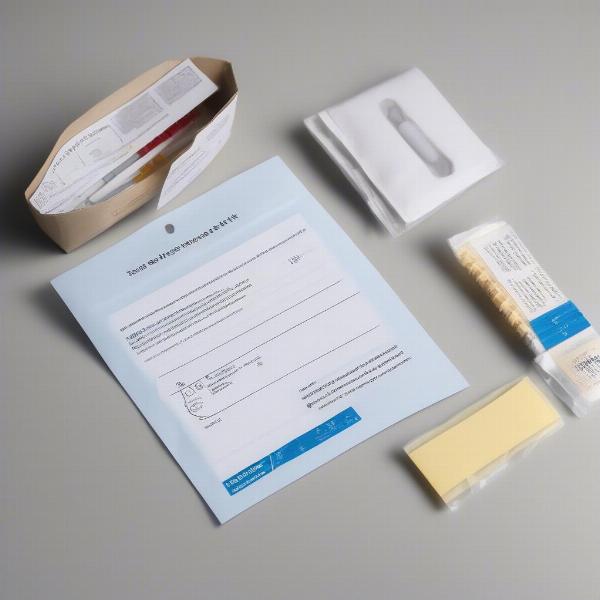Dog DNA testing has become increasingly popular among dog owners, offering valuable insights into breed heritage, potential health risks, and even personality traits. Whether you’re curious about your mixed-breed dog’s background or want to proactively manage your purebred’s health, understanding the ins and outs of dog DNA testing can empower you to make informed decisions for your furry companion. This guide will delve into the world of dog DNA testing, exploring its benefits, limitations, and how to choose the right test for your needs.
Understanding the Power of Dog DNA Testing
Why would you want to delve into your dog’s DNA? The reasons are as diverse as dog breeds themselves. Perhaps you adopted a charming mixed-breed and are eager to uncover their unique ancestry. Or maybe you’re a responsible purebred owner looking to screen for breed-specific health conditions. Dog DNA tests can provide a wealth of information, helping you understand your dog’s past and plan for their future. These tests can identify breed composition, predict adult size and weight, and even offer insights into personality characteristics. Furthermore, some tests can identify genetic markers associated with specific health conditions, enabling you to take preventative measures or seek early treatment.
 Dog DNA Test Kit
Dog DNA Test Kit
Choosing the Right Dog DNA Test
With numerous dog DNA tests on the market, choosing the best one can feel overwhelming. Consider your specific needs and priorities. Are you primarily interested in breed identification, or is health screening your main concern? Some tests focus primarily on breed ancestry, while others offer comprehensive health screenings. dog dna test The accuracy and comprehensiveness of tests can also vary, so it’s essential to research different providers and compare their offerings. Read reviews from other dog owners and consider consulting with your veterinarian for personalized recommendations.
Interpreting Your Dog’s DNA Results
Once you receive your dog’s DNA results, understanding the information can be challenging. Most tests provide a percentage breakdown of breed composition, often tracing ancestry back several generations. They may also include information about the history and characteristics of identified breeds. Health screening results typically indicate whether your dog is a carrier for or at risk of developing certain genetic conditions. It’s crucial to remember that these results are not a diagnosis, but rather a valuable tool for informed decision-making with your veterinarian.
How Dog DNA Tests Work
The process of dog DNA testing is remarkably simple. Most tests involve collecting a saliva sample from your dog’s cheek using a provided swab. This sample is then mailed to the testing company for analysis. tests for dogs The DNA is extracted and analyzed, comparing it to a database of known dog breeds and genetic markers. The results are then compiled into a report that is typically accessible online.
Benefits Beyond Breed Identification
While breed identification is a primary driver for many dog owners seeking DNA testing, the benefits extend far beyond curiosity. Early identification of potential health risks can be life-saving, allowing for proactive monitoring and preventative measures. Understanding your dog’s genetic predispositions to certain behaviors can also inform training approaches and enhance the bond between you and your furry friend. springer spaniel stud dogs
Conclusion: Empowering Your Dog’s Wellbeing with DNA Testing
Dog DNA testing offers a powerful tool for understanding and caring for your canine companion. From uncovering their unique heritage to proactively managing their health, these tests provide valuable insights that can enhance your dog’s wellbeing throughout their life. By carefully considering your needs and choosing a reputable testing provider, you can unlock the secrets hidden within your dog’s DNA and embark on a journey of informed care and deeper connection.
FAQ
- How accurate are dog DNA tests? Dog DNA tests are generally considered reliable for breed identification, with accuracy rates varying depending on the size and diversity of the testing company’s database.
- What if my dog’s DNA test reveals a health risk? It’s crucial to discuss any concerning results with your veterinarian. They can help interpret the findings and recommend appropriate next steps.
- Can dog DNA tests predict personality? While some tests offer insights into potential personality traits, these are based on breed generalizations and should not be considered definitive.
- How long does it take to get dog DNA test results? Processing times vary between companies but typically range from a few weeks to a couple of months.
- Are dog DNA tests painful for dogs? The collection process is non-invasive and typically involves a simple cheek swab.
- Can I use a dog DNA test on a puppy? Yes, dog DNA tests can be used on puppies of any age.
- What should I look for in a reputable dog DNA testing company? Look for companies with large, diverse databases, transparent reporting practices, and positive customer reviews.
Related Articles
About ILM Dog
ILM Dog (ilmdog.com) is your trusted international resource for all things dog-related. From breed selection and puppy care to senior dog health and training tips, we provide expert advice and valuable resources to help you navigate every stage of your dog’s life. We specialize in dog breeds, health, training, nutrition, grooming, and product recommendations. For any inquiries or assistance, reach out to us at [email protected] or call us at +44 20-3965-8624.